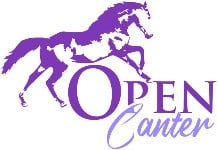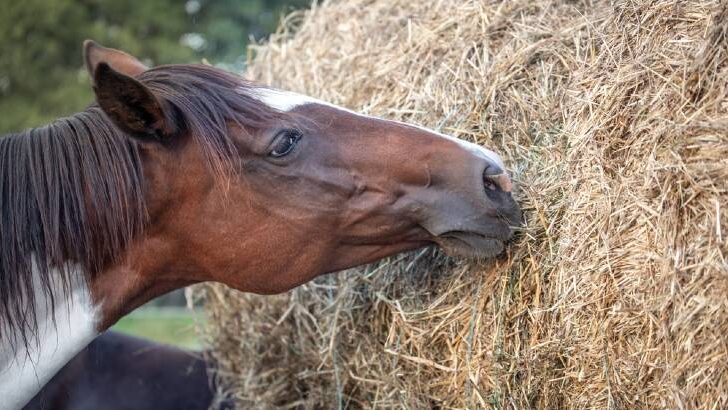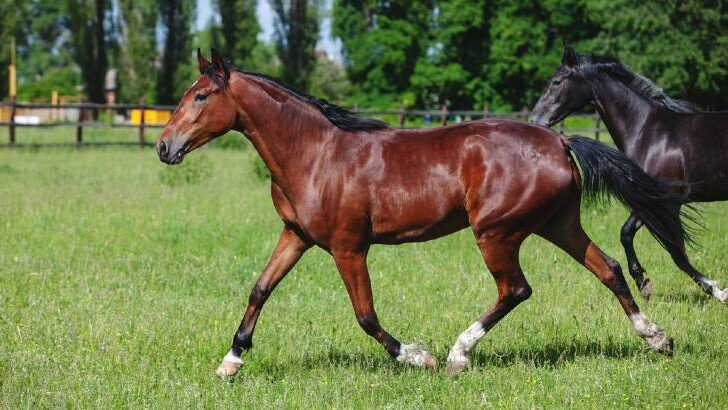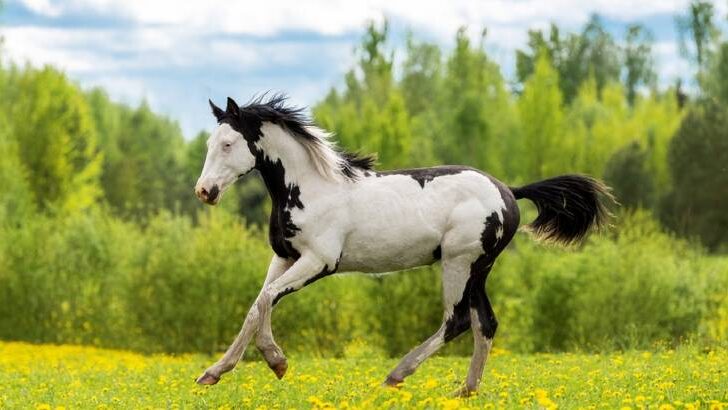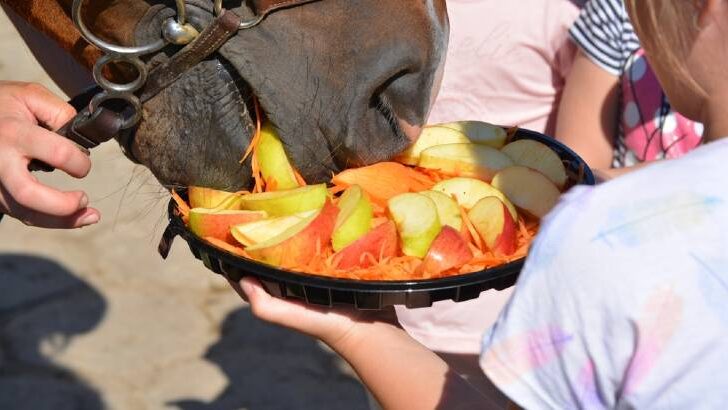Affiliate Disclaimer
As an Amazon Associate I earn from qualifying purchases. It helps me keep the website going. Thank you for your support.
For the vast majority of horses across the world, hay makes up over half of their diet. Horses require lots of fiber in their diet, and feeding hay is a great way to achieve this. Hay is simply dried and baled grass and is a staple in most equine diets. That is why it is a cause for concern if you see a horse go off hay.
There could be several reasons why you see a horse go off hay. Most commonly, the horse is suffering from some kind of health condition. This includes poor dental health, ongoing illness, colic, stress, or choke. However, the quality and taste of the hay will also affect whether or not horses will eat it.
Understanding why your horse has gone off hay is the only way you will get them to eat again. Read on to learn more about why horses might refuse hay, and what to do about it.
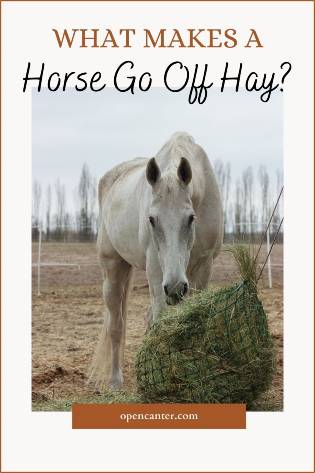
1) Dental Problems Can Cause a Horse to Go Off Hay
One of the most common causes for a horse to stop eating hay is dental problems. Horses require regular dental care to ensure they can chew properly and without pain.
Horses evolved to eat lots of tough, fibrous plants. Because of this, their teeth keep ‘growing’ or erupting throughout their life. This was so the teeth didn’t wear away completely due to the chewing and grinding required to eat tough plants.
Domestic horses often have much softer feeds to eat, and may also have soaked pellet feeds. This has changed the way that they chew and meant their teeth don’t wear down as much. The teeth can get too long and develop sharp edges.
Just like humans, horses experience toothaches! Teeth that are too long, sharp or teeth that are decaying all cause pain. This makes chewing feeds like hay or grass difficult, or even painful for your horse.
Hence, if you see a horse go off hay, it may be because it hurts them to eat it. There are some tell-tale signs your horse is experiencing dental issues. These include excessive drooling, bad breath, and dropping feed as they are trying to eat it (called quidding).
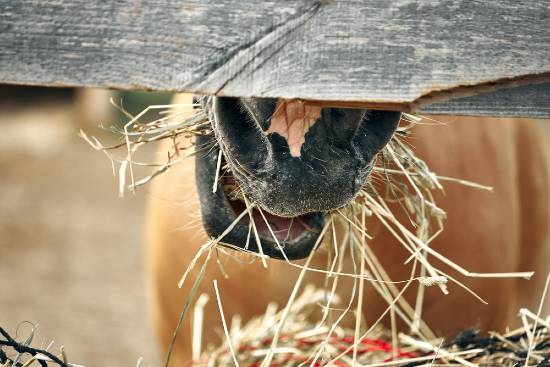
2) Different Taste Preferences
Horses can be selective eaters, and some are fussier than others. In the wild, horses had to evaluate their food before they ate it to check it was not going to make them sick. As such, horses have turned off feeds that smell moldy, musty, excessively dusty, or have a strong offensive smell.
Additionally, horses avoid eating things that have an overly strong or bitter taste. This helped them avoid eating poisonous plants in the wild.
However, it also means that a horse can go off hay simply because they do not like the taste. It might be because the hay is poor quality, or because the horse simply does not like it.
It is important to check the quality of your hay before feeding it to your horse. Inspect your hay for signs of mold, musty odors, or excessive dust, and consider switching to a fresher batch. Good quality hay should be sweet-smelling, free of dust, and have a nice pale green or yellow color to it.
Certain horses are fussy about what type of hay they will eat. There are many different types of hay available. These include lucerne, oaten, alfalfa, timothy, grass, and wheaten hays. Each hay has been baled from a different plant.
Some horses love to eat lucerne or oaten hays but will leave timothy or grass hays. This can be because the horse simply finds the timothy or grass hays too bland. Experimenting with different types of hay may help entice your horse back to eating it.
3) Feeling Unwell Can Make a Horse Go Off Hay
If you see a horse go off hay suddenly, it is a cause for concern. This is because it is an indicator the horse is not feeling very well. Not eating is a sign of issues like colic and choke. Both of these issues are considered equine emergencies.
There are some other signs that you can look out for to help pinpoint the issue. If your horse has colic, they may repeatedly bite or kick at the stomach or roll. Additionally, you will not be able to hear any or limited noise from their digestive system.
In the case of choke, the horse will usually appear distressed, and stretch their neck out repeatedly. They might also make unusual swallowing noises, or start pawing or pacing.
Most horses will refuse even the tastiest treat when suffering from one of the above issues. However, some horses will still try to eat, which is not advisable. If you think your horse has colic or choke, you need to contact your veterinarian as soon as possible.
There are a number of other things that can cause your horse to have gone off hay. If they are feeling unwell with a cold, a parasite infection, or a metabolic disorder, they might become picky eaters.
Horses who feel this way might pick at their hay, but usually won’t eat it all like they normally do. They are usually also lethargic and may have a dull coat if the condition has been ongoing.
If your horse is experiencing a period of stress or anxiety, they may lose their appetite. Horses thrive on a routine and any changes to their daily schedule or living environment can lead to stress or anxiety. Some horses are unaffected, while others are very sensitive and won’t eat for days.
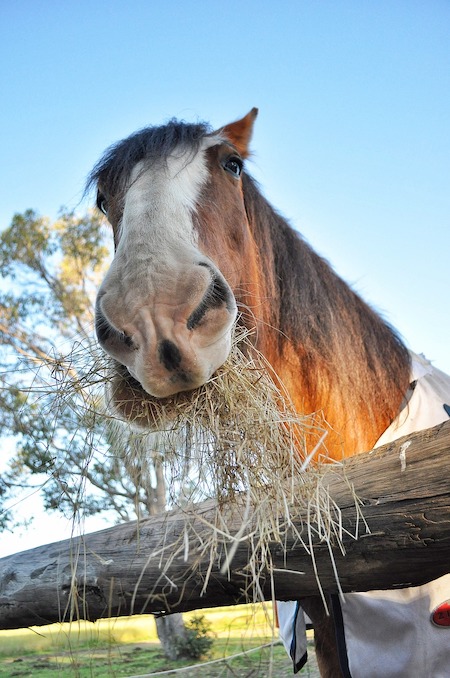
How Do I Find Out What Made My Horse Go Off Hay?
There are so many different reasons to explain why a horse has gone off hay. Because of this, it can take a lot of investigation to find the cause. You first need to determine if your hay is poor quality, or if your horse is not eating because they are unwell.
A good place to start is with an overall health examination of your horse. You can do a basic exam yourself. This will include checking heart and respiration rates, temperature, and mucus membranes.
You can also check things like if your horse has a runny nose, bad breath, or if they drool excessively. Watch your horse when they eat and see if they drop any feed or take frequent little sips of water.
Doing these checks will help you to know if you need to call a veterinarian or equine dentist. Alternatively, you can contact your veterinarian and get them to do a full health assessment on your horse.
If your horse has no health or dental issues, then the quality or taste of your hay is likely the cause. You need to check your hay for any mold, excessive dust, or discoloration. Also, check for any weeds or excessive prickles.
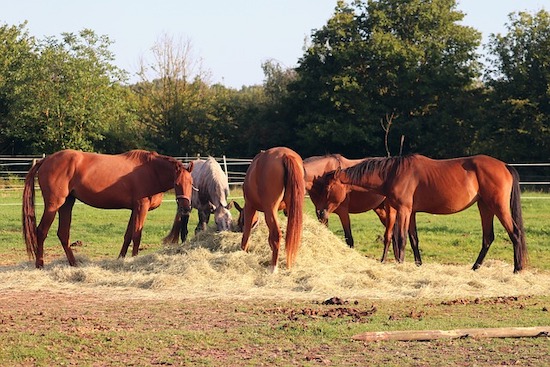
If you find that your hay is good quality, then your horse simply may not like the taste. This is especially true if other horses are eating the same hay, but your horse is not. Trial different types of hay to see which one your horse likes.
It can be helpful to talk to an equine nutritionist when changing your horse’s feed. They can help you choose what sort of hay to feed, along with choosing a commercial feed mix, if required. This will ensure your horse receives the required vitamins and minerals and is able to maintain a healthy weight.
Can’t I Simply Feed My Horse Something Else Instead of Hay?
Finding a solution to the horse that has gone off hay is not as simple as just feeding them something else. While most horses will choose a commercial feed mix over hay, you can’t feed this all the time.
There is a reason hay is a staple in equine diets. This is because it is a source of fiber, which helps keep the horse’s stomach healthy. The bacteria in the stomach are designed to digest fibrous grasses and don’t cope well with excessive grain or pellet feeds.
Giving your horse buckets of pellets might fill them up, but only for a short time. They are at risk of stomach ulcers if they do not have feed moving through constantly. Additionally, only feeding commercial feeds can lead to excessive weight gain, which causes a number of other issues. Plus – it will become very expensive!
If your horse is still eating grass, you may be able to allow him to live completely off pasture. However, this only works if you have adequate pasture to do so. Additionally, some horses are more sensitive to the sugars in grass and can develop laminitis. These horses need to be fed low sugar hay to compensate for the restriction of grass.
Final Thoughts
When your horse goes off hay, it is essential to investigate the underlying reasons and take appropriate action. If you see a horse go off hay, it usually points to an underlying health issue. However, the cause can also be the hay itself, as some horses can be quite fussy. Hay is one of the main portions of a horse’s diet, and it is essential for their health and well-being.
